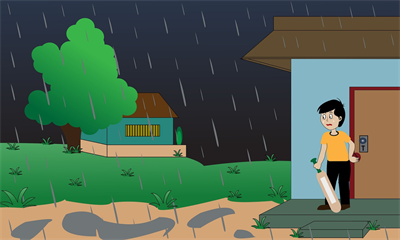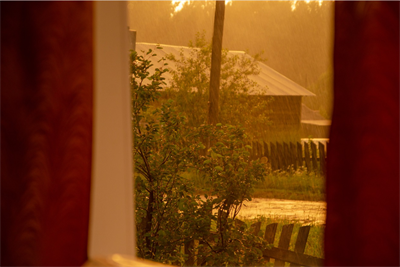PDF chapter test TRY NOW
The poet begins his narration by picturising a beautiful day. His words reflect the beauty of the events unfolding. He starts off by describing the process of how rain is made. Rain is caused by the formation of clouds. When water from the earth's surface gets evaporated, it becomes water vapour which later on becomes clouds. The clouds have water droplets, which, when it gets too heavy to stay inside the cloud, falls into the earth as rain. He calls the movement of the clouds as humid shadows. When it is about to rain, the sky becomes dark due to the formation of clouds overhead, which is very similar to a dark shadow that is cast by an object.

Dark clouds
The clouds move around the starry spheres, which is the sky. But when it is about to rain, the stars in the sky usually become dim because of the darkness, and therefore he says that it is a melancholy darkness. Melancholy, although it means a kind of sadness, here he signifies a warmth in one's heart. A lonely feeling and comfort in being with oneself is what is referred by the poet. The state of melancholy is further transferred into the next line when he says that rain weeps in tears. He beautifully compares rain to tears falling from the eyes of a lonely person. He makes the descriptions of the process of rain falling beautiful by making these comparisons.

Starry Sphere
The poet talks about a rainy day and the experiences one has when the dark clouds form in the sky to pour out the rain. Usually, when it rains outside, people complain about not being able to go out and engaging in their routine activities. People who have to work, crib about getting drenched in the rain and the discomfort of having to travel on public transport. The roads can become flooded, providing more inconvenience too. Children may not be able to go out and play. But the poet looks at it from a positive side. He expresses that it is such a blessing to take a moment's break when it is raining and not worry about the aftermath. He gives a beautiful visual description of a beautiful day, when it is raining, and when he stays indoors admiring nature's marvel. He says that sometimes it is beautiful to do nothing and just be.

Child not able to play outdoors due to rain
He describes the happiness that one can get when one presses his head over the pillow, watching the droplets of water from the window. He gives the setting of a cottage chamber bed and not that of a big bungalow or villa. A cottage is a very warm place during rain as it is not very large, and has a fire place and gives a cosy feeling. He seems to be a child when he describes the scene, as he is carefree and lies in his bedroom, listening to the sound of the rainfall on his rooftop. Rain can bring specific emotions to a person. For example, the sound of the rain can itself suffice as music, whereas the smell of the sand drenched in the rain can bring a warm feeling, making a person relaxed. A person who is a lover of these elements of rain and finds joy during rain is also named as pluviophile.

Rain viewed from bedroom
The poet helps the readers visualise a warm rainy day from the perspective of a child. The child stays indoors and admires the beauty of the rain outside, lying relaxed on his bed. The rainfall outside makes a beautiful patter sound which can be heard inside. The sound rings in his ears like music. He does not mention it as simple as rainfall or the sound of rain.

Rain hitting the roof
He rather calls it tinkle. A tinkle is usually associated with a pleasant sound, like that of an anklet or a small bell. He compares the sound of rain to a pleasant sound. The rain falls on the shingles, which can be interpreted as both falling on stones or on the tiles that are placed on the roof. As he lay below the roof on his bed, he can listen to the droplets falling above him. The sound creates a deep impact on him, such that it feels like an echo inside the heart, indicating that his heart had been hollow for so long that the rain provided relief by its sound.
The sound makes him dream of nearly a thousand fanciful things. Usually, when one is relaxed, he/she can have good dreams in sleep. He dreams of pleasant things that he has always wanted forever. He gets a positive attitude towards his dreams. Not only does it impact his dreams, but it also brings back all his repressed lovely memories. He compares it to a thread being weaved into a loom. He lays there in the bed listening to the sound of the rain, dreaming and bringing back pleasant memories.

Thread weaved into loom
The poet talks about his experience on a rainy day, where he takes a break and a moment to enjoy the rain. He is inside his house, where he experiences a lot of emotions together. The warmth of the rain brings back all pleasant memories. Usually, rainy seasons are known for giving a cosy feeling and makes one think about one's actions. It enables one to sit back and take a moment to cherish all things compared to the busy life that one leads.

It is important to take a break and cherish memories
The poet is now reminded of his mother, the way she was years ago. Unfortunately, she is no more, and the poet fondly remembers her. The rain brings not only happy memories but also bitter ones. Sometimes an object or action can bring us the memory of a long lost person. The rain thus brings back the memories of his mother. She was the source of all his dreams, as she allowed him to sleep for a long time. Mothers are generally expressive and shower unconditional love. The poet's mother also loves him that she wants her son to be well rested and to be carefree. One's childhood is usually carefree and happy as their parents take care of them. The poet can still feel the fond look of his mother when he listens to the patter of the rain on the shingles. The rain acts as the source to untangle all his emotions.

Mother and son
